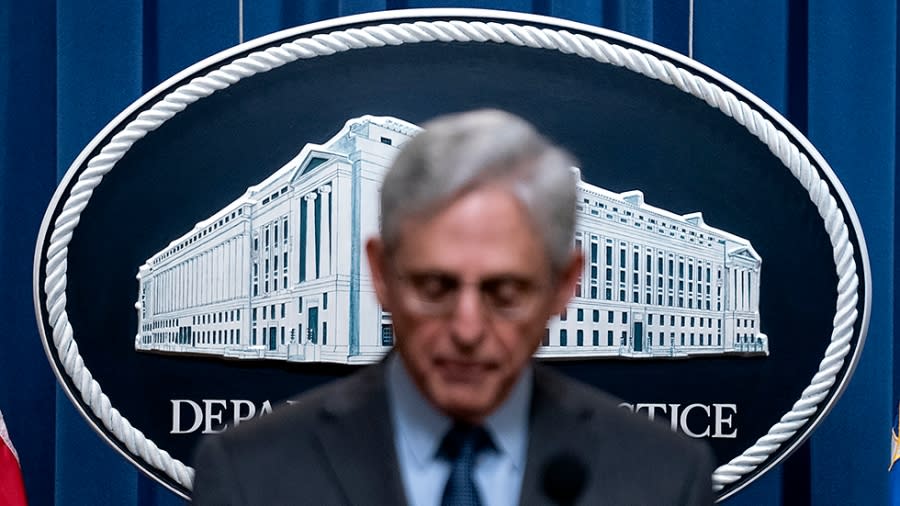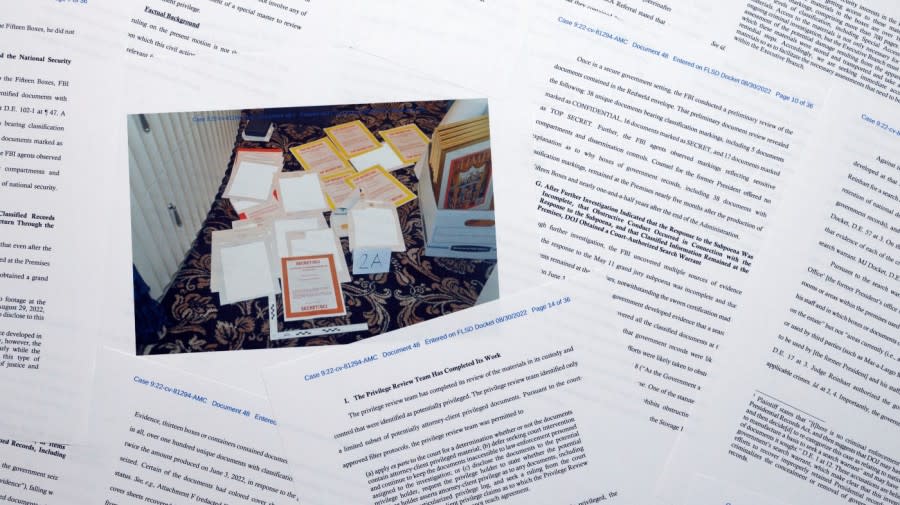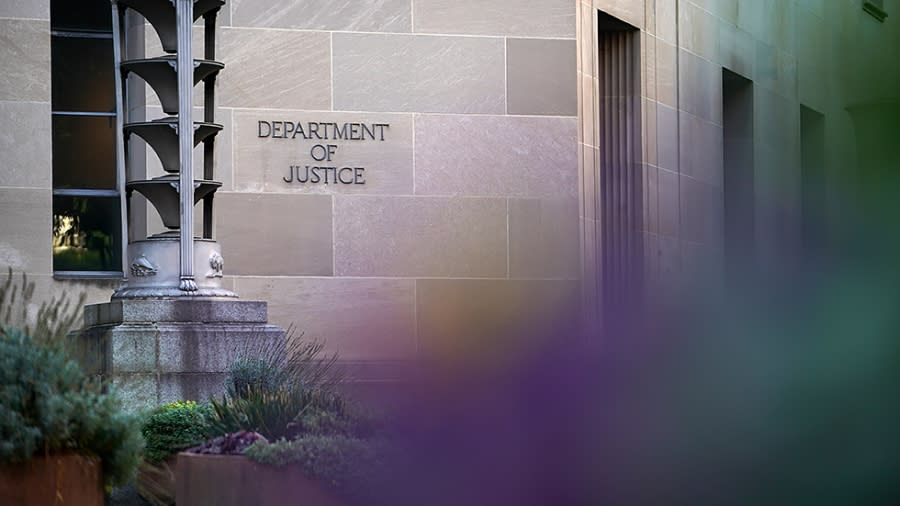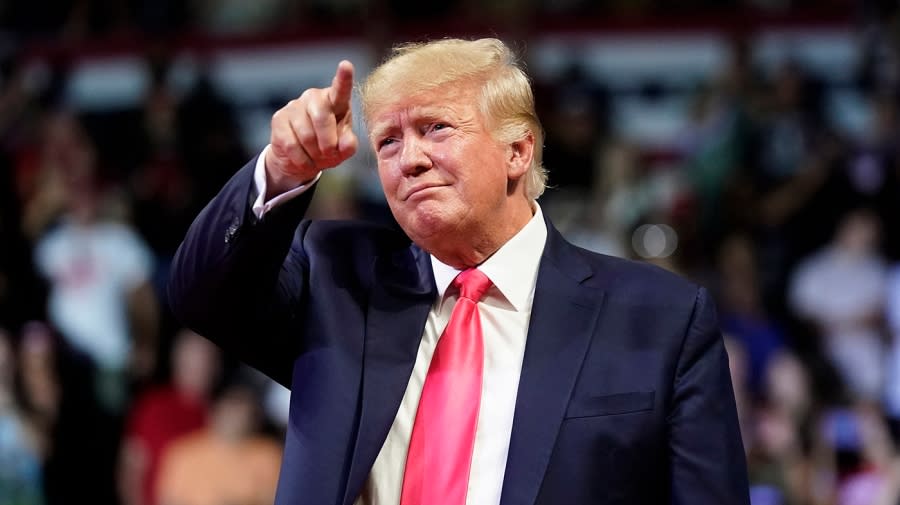Five things to watch as a special master looks at FBI’s seized Trump documents
- Oops!Something went wrong.Please try again later.
Monday’s court ruling requiring an independent review of documents seized last month from Mar-a-Lago is raising new legal questions about the reach of executive privilege while scrambling the Department of Justice’s (DOJ) investigation into former President Trump.
The decision passed down by Trump-appointed U.S. District Judge Aileen Cannon sets the stage for her to appoint an outside expert, known as a special master, to examine the thousands of documents recovered from Trump’s Florida residence after the DOJ’s extraordinary search operation on Aug. 8.
The idea is to determine which of those documents, if any, should be off limits to federal investigators based on Trump’s rights to attorney-client privilege and executive privilege.
Here are five things to watch as the process evolves.
The ruling expects cooperation between Trump and DOJ

A page from the order granting a request by former President Donald Trump’s legal team to appoint a special master to review documents seized by the FBI. (AP Photo/Jon Elswick)
Cannon repeatedly argued in her ruling that the appointment of a special master offers “at a minimum, the appearance of fairness,” suggesting the appointed official may not ultimately withhold many of the documents seized by the DOJ.
“Plaintiff ultimately may not be entitled to return of much of the seized property or to prevail on his anticipated claims of privilege. That inquiry remains for another day,” she wrote.
The ruling directs both parties to “meaningfully confer” and together craft a filing with a list of potential candidates who could serve as a special master as well as a proposal outlining any limitations on their review.
After a pointed legal battle, it’s not clear who Trump’s legal team and the DOJ might agree on, but the candidates will likely need a high-level security clearance in order to review the roughly 300 classified records recovered.
The ruling does not lay out a deadline for the special master to complete their review — though the DOJ has indicated its team was able to filter through all the evidence in two weeks.
The ruling impacts two different investigations

The Justice Department has argued Trump has no claim to any of the documents. (AP Photo)
The ruling blocks the DOJ from continuing its criminal investigation into Trump’s handling of records at Mar-a-Lago until the special master can complete their review.
As a result, at a minimum, it’s a temporary setback for the Justice Department just as it has recovered another 100 classified documents from Trump’s Florida home.
A special master more sympathetic to Trump’s broad views on executive privilege could lead to key evidence being withheld from the investigation.
The Justice Department has argued Trump has no claim to any of the documents, noting that anything protected by executive privilege would therefore belong to the government and should be maintained by the National Archives. Trump had roughly 10,000 government records at Mar-a-Lago that contained no classification labels.
Cannon’s ruling does allow the intelligence community to continue its separate review of the documents taken from Mar-a-Lago — a tranche that includes some 184 classified documents turned over in January, another 38 turned over by Trump’s team following a May subpoena and the 100 more confiscated in August.
But critics worry the limitations on the Justice Department could hamper the review led by the Office of the Director of National Intelligence (ODNI), which is set to assess the potential fallout from the alleged mishandling of the documents as well as the risks to national security.
It’s a task that has become only more pressing since a DOJ inventory unsealed by Cannon revealed that among the evidence were numerous empty folders that once held classified documents as well as materials designated to be returned to the military. The revelation has raised questions about whether those materials were found elsewhere in the boxes and if they have been accounted for.
It also complicates matters for the FBI, one of the 18 agencies overseen by the ODNI.
“The FBI’s investigation and the Intelligence Community (IC) assessments are inextricably intertwined from a counterintelligence perspective,” Brian Greer, a former CIA attorney, told The Hill by email.
“To assess the risks, it’s important for the IC to know who accessed a given document, and they can only get that from the FBI. But if the court prohibits the FBI from accessing certain classified documents because they might be subject to an executive privilege claim, that process will break down,” Greer added.
A highly unusual decision

Pages from a Department of Justice court filing on Aug. 30, 2022, in response to a request from the legal team of former President Donald Trump for a special master to review the documents. Included in the filing was a FBI photo of documents that were seized during the search. (AP Photo/Jon Elswick)
Perhaps the most controversial part of Cannon’s ruling is the provision granting the special master the power to determine if any of the seized documents are protected by executive privilege — an authority typically reserved for the president.
That stipulation has created a highly unusual scenario in which Trump, while no longer a part of the executive branch, could claim executive powers over the existing Justice Department — pertaining to documents that federal law suggests should belong to the government.
Former Attorney General William Barr, who served under Trump, has said that while some of the seized documents might be protected by attorney-client privilege, his ex-boss has no right to claim executive power over the others as a private citizen. That’s particularly true, Barr said, when it comes to sensitive material.
“All the other documents taken, even if they claim to be executive privilege, either belong to the government because they’re government records — even if they’re classified, even if they’re subject to executive privilege, they still belong to the government and go to the Archives,” Barr told Fox News last week.
“I can’t think of a legitimate reason why they should have been — could be taken out of the government, away from the government, if they’re classified,” Barr said.
Trump’s effort to keep government documents after leaving office is not unprecedented: Nixon also challenged the powers of government archivists to retrieve presidential papers and tape recordings after he’d exited the White House. Nixon lost that challenge in a landmark 1977 Supreme Court case, on which the Justice Department has leaned this year in arguing against the appointment of a special master.
Cannon rejected the DOJ’s argument, writing that the 1977 decision “did not rule out the possibility of a former President overcoming an incumbent President on executive privilege matters.” Trump might ultimately fail in his effort to shield certain documents by executive privilege, she said, but he at least has the right to try.
“Even if any assertion of executive privilege by [the] Plaintiff ultimately fails in this context, that possibility, even if likely, does not negate a former President’s ability to raise the privilege as an initial matter,” Cannon wrote.
DOJ has to weigh appeal and whether to let ruling stand

The DOJ could also file a motion for clarification or reconsideration. (AP Photo)
The Justice Department could appeal Cannon’s ruling — but in doing so must weigh a number of factors.
An appeal, especially one seeking to block Cannon’s decision, would eat up time and continue to subject the department to claims of politicization as Trump rails against the investigation.
But not taking action carries its own risks, particularly when it comes to the precedent that could be laid out in the ruling with regard to executive privilege and the ability of litigants to use civil suits to stall criminal investigations.
Special masters are commonly used to help screen for any evidence that might be covered by attorney-client privilege, but asking one to weigh executive privilege concerns is new territory.
Cannon’s ruling devotes remarkably little time to weighing the DOJ’s arguments in the case when it comes to the national security implications of the investigation — both its own and, most particularly, the review being carried out by the ODNI.
Beyond an appeal, the DOJ could take other less commonly used approaches, including filing motions for clarification or reconsideration as a way to expand on its argument that a special master could hamstring national security efforts.
Rare win for Trump in a bad month

Trump is facing legal troubles as he weighs a possible White House run in 2024. (AP Photo)
For Trump and his followers, Monday’s ruling was a rare glimmer of light in a stormy month.
The FBI’s remarkable search of Mar-a-Lago on Aug. 8 was a humiliating episode for the former president, revealing that he had hoarded troves of government documents — including many alleged to be highly classified — even after his lawyers had assured the DOJ that all such materials had been returned to the National Archives earlier in the year.
A day later, a federal appeals court ruled that Democrats on the House Ways and Means Committee should be granted access to Trump’s tax returns, ending a years-long standoff over the disputed records.
And just one day after that, Trump was deposed in Manhattan by New York’s attorney general, who is conducting a wide-ranging investigation into Trump’s finances and business dealings. He pleaded his Fifth Amendment right against self-incrimination more than 400 times.
The back-to-back episodes highlighted the simmering legal troubles facing Trump as he weighs another run at the White House in 2024. In Cannon’s decision to appoint a special master — a move that has, at the very least, delayed the criminal investigation into his handling of documents — Trump found a unique reason to celebrate. He did so, in part, by blaming the “fake news,” Democrats and anti-Trump Republicans for his predicament.
“All American Patriots know that I always do everything ‘by the book’ and that this Hoax will fail miserably,” he said Tuesday in an email blast soliciting donations to his PAC.
Cannon’s ruling does not mean Trump is out of the woods. Kel McClanahan, executive director of National Security Counselors, a nonprofit law firm specializing in national security law, previously told The Hill there are ways a special master could ultimately backfire for Trump.
He noted a special master could easily decide the FBI did not obtain any materials that should be protected by either attorney-client or executive privilege, as Trump is asserting, undercutting a major argument for a former president who often likes to claim he’s been treated unfairly.
“He won’t be able to say, ‘The DOJ privilege review team wrongfully decided it.’ He’s going to have to say, ‘The DOJ privilege review team, and the subject matter expert that I asked for, and a federal judge wrongfully decided it,’” McClanahan said.
“And in an area like this where there’s not a whole lot of room for him to be right — that’s a very risky move,” McClanahan added.
For the latest news, weather, sports, and streaming video, head to The Hill.

